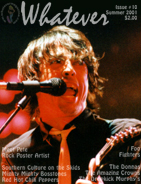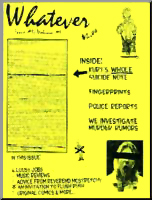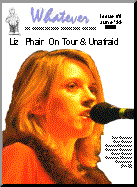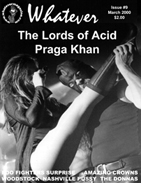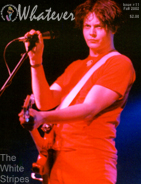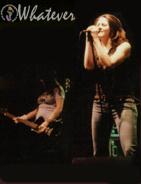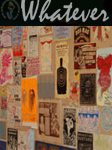Interview with Rick Miller, Southern Culture on the Skids
Whatever Magazine: You have a new CD, Liquored Up and Lacqured Down, that you realeased on the internet as well for stores.
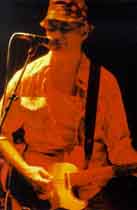
|
Rick Miller: That was the label that really signed us, Emusic. One of the reasons that that happened was because our old Geffen A&R guy ended up at Emusic. He knew we were looking for a deal and we just ended up with them. Then they did a deal with TVT to release all the CD's in the stores- do all the distribution for us. Hard product is I guess what they call it now. |
RM: Why not, the old one sucks.
WM: Did you have much luck with the regular record deals that you've had?
RM: We did o.k. We always recouped on our record deals, like even with Geffen. It was just always really hard to get them to support our band. You know, they are so geared towards million selling records that anything else they really just don't care about. We're just not that kind of band. We have a loyal following, but we need to be promoted. We tour, but we don't just do six weeks and hit all the major cities expecting Mtv to do the work for us. We get out on the road and do it
WM: You are still doing a hundred plus shows a year?
RM: Yeah, and Geffen had a problem with that. They didn't how to deal with it actually. Because we didn't have the demographic that they needed, we didn't have the crowd of sixteen to eighteen year olds that they are geared to sell to, so we just said, "So long," and we left. After that they promptly went out of business.
WM: I heard that you built a studio to record, 'Liquored Up and Lacqured Down.'
RM: Yeah, we kind of built it and recorded as we went actualy. It was out in the country outside of Chapel Hill. It looks like an old volunteer fire station. (Drummer Dave Hartman laughs from his seat where he watches us.) We've got a big room with a high celings, and the band sounds great in there.
WM: What kind of equiptment did you use in there?
RM: Its all analog. There is some digital stuff, I did some digital overdubs digitally on the new CD because I was by myself and I couldn't do the punch in's with the analog stuff. 90% of the record was recorded on the analog stuff.
WM: But you are not opposed to the digital stuff?
RM: I'm not opposed to the digital thing, I prefer analog though.
WM: Have you lived in Chappel Hill your whole life?
RM: No, I lived in Henderson, NC for a while, then I lived in San Diego, CA for a while, then I moved back to Carolina. My dad was always in the South East, my mom lived in California. Dave and Mary are from Raonoke, and we all ended up in Chappel Hill. We're all pretty much in North Carolina, Virginia.
WM: You covered some new ground on, 'Licquored Up and Lacqured Down."
RM: Yeah, some salsa. And we got our road guy, Ed, you might know him from firehose, from Ohio. He gets up and does some trumpet with us on the title track. Yeah, we did some new sounds for us I guess.
WM: It is still very traditional sounding, but it covers country, rock, salsa, and blues I guess. Is that a reflection of age, or
RM: Yeah, I've always wanted to do something with loops, and some stuff like that- some kind of surf guitar layering or something. But it takes time to do, and time to learn the technology and stuff like that. Usually the way we work a song up is very oraganic and it just seems to work very well. And I think you get more into trying to write good songs instead of being novel, you know what I mean?
WM: Yeah, do you write most of the lyrics before hand?
RM: Some songs tend to be more together than others, but we always get together and reherse and arrange them together and record them together.
WM: One of the new songs, 'Learned to Dance in Mississippi,' is about Jonior Kimbroughs juke joint, did you go there?
RM: Yeah, we actually played there one night. We weren't booked, but we played. We had some friends that know Junior. We were up in Oxford, Mississippi and they drove us down. They introduced us to Junior and his leg was hurting him a bit because he had a stroke a few years earlier. And he found out we were a band so he wanted us to play, so we went out and got our instruments and played.
WM: Were you pretty well received?
RM: Yeah. They were great. But they've got some great dancing down there. Its still down and dirty.
WM: Really?
RM: Yeah, it was awesome, that's why I wrote the song. Places like that are still around, but I don't know how many of them are left. Its kind of a generational thing and once that generation dies who knows?
WM: The guy who runs Fat Possum Records is doing a decent job of recording those guys that are left.
RM: Yea he is. There is a lot of that music up in northern Mississippi.. I like him because he puts out some good rocking blues.
WM: I know you've played with Link Ray once, have you ever gotten to perform with any other greats?
RM: We played with Brian Setzer and his orchestra once, that was awesome. That was really entertaining. I played with Pop Staples one time, Staple Family Singers is one of my all time favorites. We get offered some great tours, like Brian Setzer, and the Foo Fighters, X, but we just can't seem to do it because we are always booked so far ahead.
WM: Well you do seem to run a really tight tour business. I noticed earlier watching you set up that everybody knew what to do, and while on one hand you were just playing with Peanut (his dog) it was only because Mary had taken care of the food per diem, and the other guys had set up the stage, and the booth was already set up for tshirts and CD's. You work like a well oiled machine on the road.
RM: We've been doing this a long time. We remember. We remember Providence. There's no place to eat past nine except the Diner. Dave Hartman: That's where I ate. That place is awesome.
RM: I'm gonna go there soon.
WM: Are you planning on doing any cybercasts?
RM: Yeah, lots of our shows are on the internet. Were going to do one in Chicago this time around, for Yahoo. For Rolling Stone. And we've done the digital club network which we did a few nights ago. I think that's what's good about the internet, you just can't get that stuff on the radio anymore.
WM: Yea, I like internet radio better that regular now.
RM: I think its gonna take a while. Its not gonna be like thy said it was. I think Emusic is gonna go through some hard times trying to work into the music business. But, sooner or later man, its just too consumer friendly not to work.
WM: Its just too much of an opportunity to pass up as well.
RM: Yeah.
WM: Your website is being revamped at the moment. Do you ever play a part in making it up?
RM: No, but its because the people that do it do such a great job. We'll send them pictures and stuff, but that's about it. Now though its being taken over by somebody, Artist Direct. It remains to be seen how that's going to work. They are also taking over the merch, because we didn't have the capacity to do credit cards and things like that. I really don't know very much about the website. We still control our merch at the shows.
WM: So I guess that's about it. What's the tour looking like? I know this is just a mini tour until 2001 when you do a big one. Are you going to do Europe or Australia?
RM: Europe I don't know. Australia I know we'll be going to in January or February. Spain is on hold right now. We're gonna be out west Jan Feb, and then do two more major tours in the next year.

